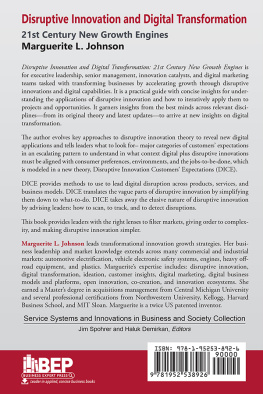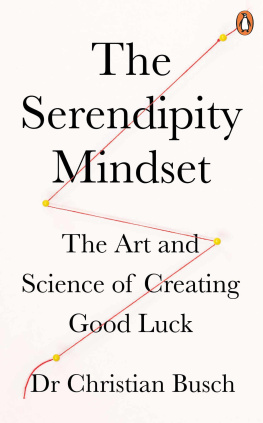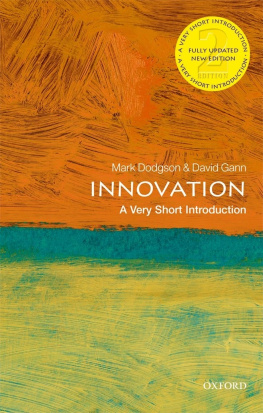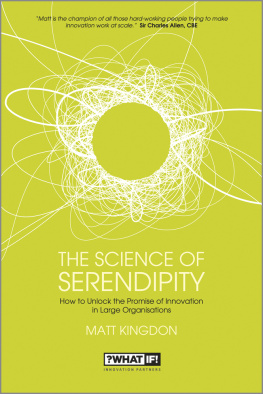In Defence of Serendipity
Praise for In Defence of Serendipity
I was deeply moved by this melancholy work, which sums up a generation of hectic labor by so many of my innovative friends and colleagues. Yes, the Digital Revolution has eaten its young, as indeed most revolutions do. It went from movement, to business, to racket, and if you read Seb Olma, youll have an inkling of how and why that happened, and what must come next.
Bruce Sterling, sci-fi writer and futurist
In this practice-driven and original essay, Sebastian Olma successfully catapults dialectics into the heart of the brutal creative industry rhetoric. Good luck picking up the bits and pieces after the blast!
Geert Lovink, net critic
Sebastian Olmas timely meditation on the uses and abuses of serendipity sets out to free chance invention and accidental discovery from its corporate and state captivity in the creative industries. His defence of serendipity as a sagacity of resistance dedicated to an open future is made with a wit and lightness of spirit conspicuously absent in the lugubrious managerialist appropriations of the term. His erudite polemic convinces the reader that as Pasteur might now say chance favours the mind prepared to change.
Howard Caygill, philosopher
SEBASTIAN OLMA
In Defence of Serendipity
For A Radical Politics
of Innovation
Published by RepeaterBooks
An imprint of Watkins Media Ltd
19-21 Cecil Court
London
WC 2 N 4 EZ
UK
www.repeaterbooks.com
A Repeater Books paperback original 2016
Copyright Sebastian Olma 2016
Sebastian Olma asserts the moral right to be identified
as the author of this work.
ISBN : 978-1-910924-34-1
Ebook ISBN : 978-1-910924-35-8
Cover design: Johnny Bull
Typography and typesetting: Jan Middendorp
Typefaces: Chaparral Pro, Absara Sans
Printed and bound in Great Britain
All rights reserved. No part of this publication may be reproduced, stored in a retrieval system, or transmitted, in any form or by any means, electronic, mechanical, photocopying, recording or otherwise, without the prior permission of the publishers.
This book is sold subject to the condition that it shall not, by way of trade or otherwise, be lent, re-sold, hired out or otherwise circulated without the publishers prior consent in any form of binding or cover other than that in which it is published and without a similar condition including this condition being imposed on the subsequent purchaser.
Contents
PREFACE
The Great Digital Swindle
by Mark Fisher
Who dares dissent from the gospel according to Silicon Valley? There is we are insistently told no alternative to the invasion of capitalist cyberspace into all areas of consciousness and culture. Anyone who expresses even the mildest scepticism about social media and smartphones is roundly denounced as nostalgic. The old, desperate not to seem out of touch, rarely dare question the youngs compulsive attachment to their smartphones. Anti-capitalists join with tycoons to celebrate the potentials of network society. In article after article, conference after conference, the new is routinely equated with the digital, to such an extent that is now difficult to remember a time when technology wasnt a shorthand for communicative software. When mobile phones entered the marketplace, they were the object of mockery: who could be so self-important as to believe that they needed to be contactable everywhere and anywhere? Now, everyone is required to act like some cross between a hustler always on the make and an addict jonesing for contact.
But how has this model of progress, in which history culminates in the glorious invention of iPhones and apps, become so uncontested? And, if we attend closely, isnt there a desperate quality to all this cheerleading? Addicts always rationalise their compulsions, but the desperation here belongs to capital itself, which has thrown everything at the great digital swindle. Capital might still swagger like some data cowboy, but iPhones plus Victorian values can only be a steampunk throwback. The return to centuries old forms of exploitation is obfuscated by the distracting urgencies of digital communication.
What if Silicon Valley was not as we are relentlessly hectored to believe a stupendous success story, but a massive monument to failure? In Defence of Serendipity encourages us to pose this counter-intuitive question. Sebastian Olma demonstrates that neoliberal capitalism has systematically destroyed the conditions which allowed Silicon Valley to emerge, at the very same time as it pimps 70s California as the definitive model for all cultural as well as business innovation. In Olmas narrative, Steve Jobs and the other Californian oligarchs come to seem like the hapless figures from a fairy tale. They wished to totally transform the world, but instead they received unimaginable wealth. Their devices only led to more of the same: the changeless change of a capitalism that endlessly crows about innovation in a manic attempt to cover over the glacial monotony of its homogeneity and repetitiveness. The Silicon Valley princes provided capital with new tools of capture and captivation. More than that, they gave capital a new hymn sheet, a way to sell drudgery as creativity and hyper-exploitation as sharing, so that we are all expected to be passionate about our cyber-serfery.
It is by now screamingly clear that innovation does not spontaneously effloresce when capital dominates society and culture. Generalised insecurity leads to sterility and repetition, not surprise and innovation. The conditions in which the new can appear have to be produced and nurtured. This, Sebastian Olma demonstrates, is the real import of the concept of serendipity when it is properly understood. The irony of Silicon Valley is that its very hegemonic dominion has contributed to the disappearance of such conditions in the capitalist world. Silicon Valley emerged from the serendipitous synthesis of the counterculture and state-sponsored cybernetics, but neoliberal capital has destroyed the possibility of a counterculture even as it has annexed and subdued the state. In Defence of Serendipity shows that that the real future is building itself beyond the instrumentalising urgencies of business, in the spaces between a new bohemia and a revived public sphere.
PROLOGUE
Serendipity, Innovation and the Question of the Future
1. In Defence of Serendipity
Serendipity is a unique term in the English language describing the process by which one finds something useful, valuable or just generally good without actually looking for it. Throughout the history of invention and discovery serendipity has functioned as a sort of Freudian unconscious, leading or perhaps better, tricking the curious human mind onto unexpected novelty. And yet, it is only recently that we are becoming truly aware of the crucial role serendipity plays in our attempts to creatively grasp toward the future. Over the last few years, it has become an important, if not overused, reference for the creative industries, as well as for our innovation-obsessed economy in general. This is remarkable as serendipity was originally conceived in the middle of the 18th century within literary circles, where it led its marginal existence until very recently. Horace Walpole, art historian and eccentric son of the first British Prime Minister, coined the term in 1754. He had come across the silly fairy tale









